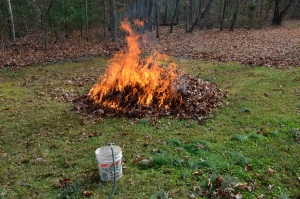Fire Prevention Critical During Tennessee's Fire Season

NASHVILLE – As Tennessee heads into fall fire season, the Tennessee Department of Agriculture’s Division of Forestry (TDF) is observing National Fire Prevention Week October 8 – 14, 2023. Due to the drier conditions and leaf litter that accompany autumn in our state, a debris burn permit is required for leaf and brush pile fires beginning October 15 and residents are urged to take appropriate fire safety measures.
“There is a heightened risk of wildland fire this month in Tennessee,” State Forester David Arnold said. “Risks associated with careless debris burning are high, particularly during fire season when conditions are dry and natural fuel is abundant. If you plan to burn, you must obtain a permit where local governments don’t have established outdoor burning ordinances. Remember to stay with your fire, establish a safe perimeter, and keep tools on hand to control the burn.”
Debris Burn Permits for leaf and brush piles are available at no charge via the MyTN mobile app or online at www.BurnSafeTN.org. Apply the same day you plan to burn. Online permits may be obtained daily from 8 a.m. to 11 p.m. in Eastern and Central time zones (based on your location) for any size leaf and/or brush burn pile, as well as prescribed fires and broadcast burning, such as for forestry, agricultural, or land clearing applications. Each fire should be completely extinguished by the permit expiration.
Residents with limited internet access may call the Division of Forestry burn permit phone number at 877-350-BURN (2876) Monday through Friday, 8 a.m. - 4:30 p.m. Central. This phone line will open October 13 to issue permits in advance for Sunday, October 15 as long as forecasted conditions are favorable for safe debris burning. Callers may experience lengthy wait times when call volume is high, so online applications are encouraged.
The online permitting system is a streamlined and efficient process for residents to obtain burn permits. This year, there are fewer application steps, easier navigation, and applicants may save their information for future burn permit applications.
Permits are issued only when conditions are conducive to safe burning. If you live inside city limits, check with your municipality for additional restrictions before you burn.
A list of materials that are not allowed to be burned can be found from the Tennessee Department of Environment and Conservation at www.tn.gov/environment/program-areas/apc-air-pollution-control-home/apc/open-burning.html. Call 1-888-891-TDEC to report illegal burning.
Burning without a permit is a class C misdemeanor and punishable by up to 30 days in jail and/or a fine. Individuals are legally required to stay with their fire until extinguished.
The following tips should be followed when it is safe to conduct a debris burn:
- Check with local authorities to make sure there are no local restrictions on burning currently in place, especially in cities and towns that have their own outdoor burning ordinance.
- GET A PERMIT. A permit is required from the Tennessee Division of Forestry from October 15 to May 15 where local restrictions do not supersede.
- Notify your local fire department and neighbors to let them know your plans to burn.
- Do not burn on windy days.
- Stay abreast of changing weather conditions.
- Establish wide control lines down to bare mineral soil at least five feet wide around burn piles.
- Keep fire containment equipment on hand during the fire (e.g. rake, shovel, water).
- Stay with the fire until it is completely out.
Visit www.BurnSafeTN.org for additional tips to burn safely and to protect your community.
To get updates on wildfire news and fire risk in Tennessee, follow @TNWildlandFire on Facebook, Instagram, X, and Threads.
The Division of Forestry protects and promotes the responsible use of forest resources in Tennessee. Focus areas include assisting landowners with a variety of services, providing quality tree seedlings, supporting forest health programs, collecting forest inventory data, assisting forest industries, and fighting wildland fires. Visit www.tn.gov/agriculture/forests for more information.